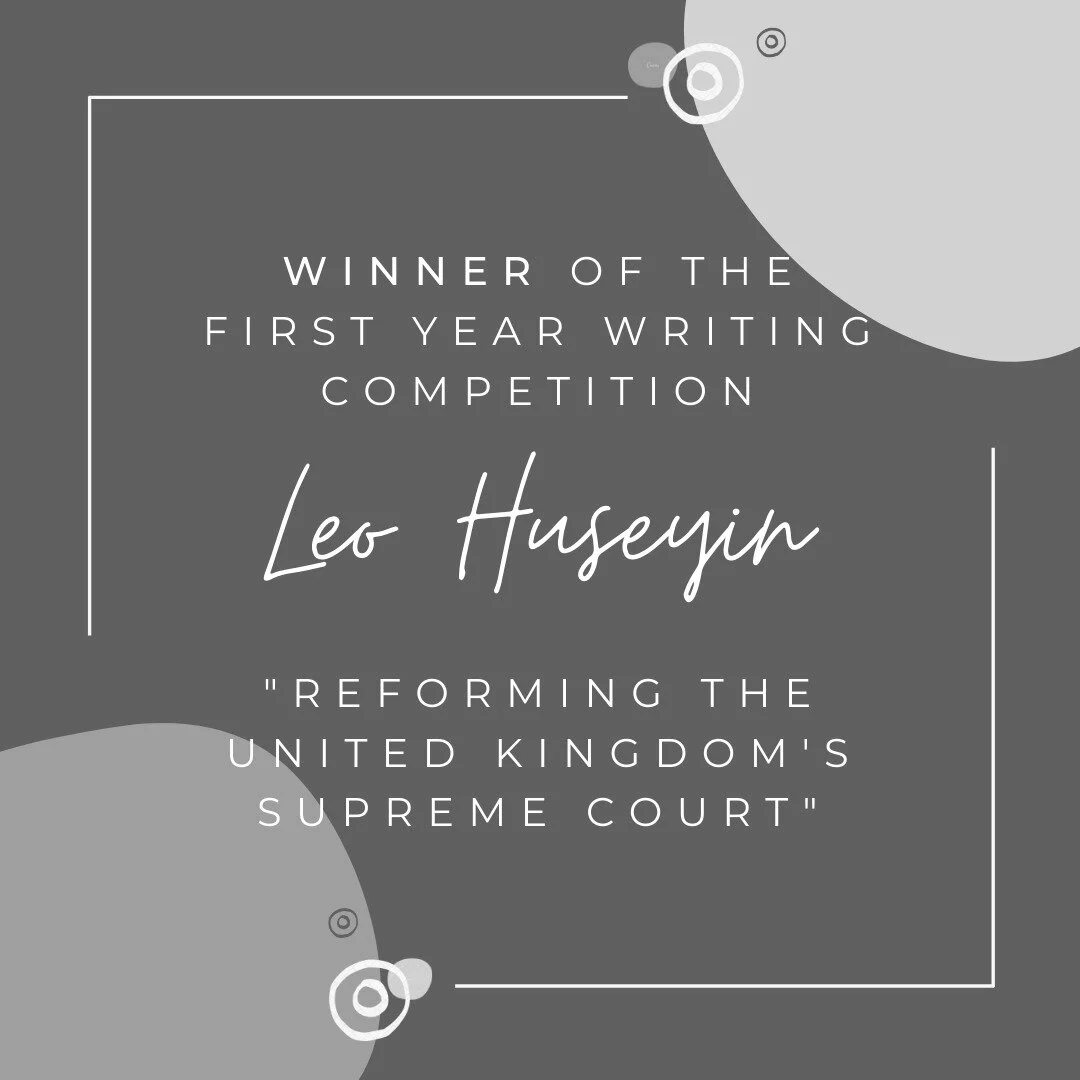Obiter Dicta is the student-led publication for the Warwick Law Society. We provide a space for students and academics at Warwick to express opinions about the law and beyond.
2020-2022
New Prosecutor, Same Challenges
With a promise to ‘best serve the cause of justice’, Karim Ahmad Khan was named the new chief prosecutor of the International Criminal Court, making him the future public face and chief strategist of the tribunal responsible for investigating grave national atrocities which demand supranational attention. Khan will be the third person to hold the job when he takes over from Fatou Bensouda, whose nine-year term ends on June 15.
First Year Writing Competition Winner: ‘Reforming the UK’s Supreme Court’ by Leo Huseyin
The winning piece from our first-year writing competition earlier this year!
Amy Coney Barret - The End of Progressive Politics
“Now, a third appointment has been confirmed to the Supreme Court to replace the late liberal judge Ruth Bader Ginsberg: Amy Coney Barrett. Barrett is a favourite - little else can explain the dramatic rise of someone who until 2017 had never sat as a justice. “
The British Constitution is Not Fit For Purpose: For and Against
The UK has survived for centuries without a constitution. This somewhat peculiar arrangement is only paralleled in a handful of countries. In recent years the UK’s constitution has undergone drastic reform, with the introduction of the Human Rights Act 1998, the devolution of power to the nations and the creation of the Supreme Court. Is the next step the codification of the constitution?
UK Digital Services Tax - A Crushing Blow to Tech Giants?
Physical presence used to be a salient part of international business, as any company looking to expand abroad must have had some factory, retail store, or office in that country to operate. However, since the increase of digital technologies, physical presence and the company’s place of domicile, at least by its literal definition, no longer holds such significance.
Bush v. Gore - Trump v. Biden?
Coronavirus has led to changes in the way a variety of things are done. This includes voting. As a result of the pandemic a record number of Americans are expected to make use of postal voting. In addition to the obvious delays in counting, a drastic increase in mail-in ballots could have the impact of opening the floodgates of litigation, requiring the Supreme Court to take action, which could have decisive consequences for the result of the election.
Opinion: ‘Activist’ and ‘lefty’ lawyers are simply doing their jobs
A fair and just court process demands that clients on both sides have competent representation. Why then are some notable ministers trying to villainise lawyers for trying to do what they should to uphold the rule of law?
Law in Film: An Analysis of I, Daniel Blake and its Representation of the Failures of the Welfare System
Though released in 2016, the issues raised by Ken Loach’s I, Daniel Blake about the changes enacted by the Welfare Reform Act of 2012 have remained just as pressing in 2020. In the midst of loud calls for (what was said to be necessary) austerity, the act saw the introduction of Universal Credit and a simplification of the welfare system to ‘improve incentives to work’. Loach’s film uses emotional drama to highlight the plethora of problems faced by the individuals forced into the benefits system.
Ruth Bader Ginsburg: Her Life and Legacy
Ruth Baber Ginsburg will go down in history as a legal pioneer, feminist icon and above all a beacon of American progress. If you were to trace her career, you would find the remnants of several glass ceilings.
UK plans to break International Law
In recent months, Brexit has taken a backseat in most people’s minds. Whilst the saga dominated political, legal and economic news after the decision to leave the European Union (EU) in June 2016, the matter has more recently played second fiddle to the government’s response to the COVID-19 pandemic. Yet, Brexit has once again come to the fore as a contentious issue in the lead up to the official end of the UK’s transition period at the end of December, as stipulated by the Brexit Withdrawal Agreement settled in November 2018.
Is the English Defamation Law an invasion of free speech?
The media commenting on an individual or organisation’s actions and character is an unexceptional occurrence. However, it becomes problematic when they assert their opinions, and project their bias, to the detriment of the relevant party’s reputation.
A Double-Bind for Refugees: Shortcomings of the U.S.-Canada Safe Third Country Agreement
Since 2004, the Safe Third-Country Agreement (STCA) has regulated the flow of migrants entering Canada from the US. However, the STCA may have run its course, according to a Federal Court ruling handed down in June.
Government ban on evictions comes to an end
At the height of the unprecedented Coronavirus pandemic the government was required to take drastic steps to counteract the economic fallout. As millions of people were mandated to stay at home and therefore away from work, their means of living, it was exceedingly clear that an eviction ban would be necessary. With the ban on evictions now lifted, there is a backlog of cases which are set to resume.
Is the EU to blame for the “tampon tax”?
The decision to scrap the tax follows decades of campaigning by various women’s groups for feminine products categorised by the European Union as “luxury” items, to be considered necessities.
Social Media and Litigation: An Untrod, Thorny Path
From the pro-anorexia forums which inflamed public opinion during the early 21st century, to the current focus on fostering a positive body image amongst the youth of the day, social media and body image have long been examined in light of the other.
The Need for More Legal Routes to the UK
This year, 4,000 people have attempted to cross the English Channel. This does not even include those who were stopped by the French Navy before entering British waters. The government’s response to the dangerous crossings these migrants were making? Restrict the viability of these routes, restricting the ability of migrants to exercise their right to apply for asylum.
Why assisted dying could be legalised in the UK within the next four years
Recently, leading Conservative MP Andrew Mitchell suggested in an interview with Sky News that the mood in Parliament was changing and that assisted dying could be legalised in the UK within the next four years. Under the current law in England and Wales assisted suicide is a crime punishable by up to 14 years imprisonment. There have been attempts to legalise it in the past, most famously Lord Falconer’s Assisted Dying Bill in 2014, however, they have never won enough support in Parliament.
The rise of Fintech and its impact on the world of commercial law
Fintech is an umbrella term used to describe advanced software technologies used by businesses to transform and innovate the way they operate their financial services. With today’s corporate industry fuelled by market competition, the progressive use of Fintech systems has shown to pave a way to new economic success through the seamless, unconventional approach it brings to finance management.
Where Do Smart Contracts Find Themselves Within English Contract Law?
The phrase ‘smart contract’ understandably evokes futuristic images of autonomous robots conducting agreements with each other. In actuality, smart contracts are modelled on the basic concept of a digitalised entity automatically conducting a transaction on the behalf of contracting parties - much like the idea of a vending machine.
Can you trademark a colour?
A monopoly on a colour seems an odd thing but yet it has been fought hard for. An analysis surrounding the $1’000’000 case regarding Louboutin’s signature red-soled shoe.




















